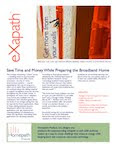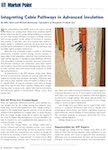A recent Op-ed piece hinted at deeper than obvious economic woes – the first real suggestion that we’re headed for a third depression. Economics, the dismal science – depressing, perhaps – but read on.
I follow many economists, gathering diverse opinion on matters of finance, business, policy, and history. In this case the author is Paul Krugman, one who I often read for logic that proves prescient. Consistently, he shares historic lessons and encourages policy favoring jobs creation and deflation avoidance as opposed to a focus on immediate deficit reduction and the distant threat of inflation. This, of course, comes at the cost of deficit expansion during a time of already ballooning national debt. The Krugman approach (and that of many other smart folks) is counterintuitive. Why spend when the national debt is already so great? Proposed alternatives suggest paying down national debt immediately (while important for discussion, the alternatives are rhetorical, parroting what we've heard for decades) They fail to acknowledge that tax revenues are generated by those who are employed...and at the moment we have eight million who are unable to contribute. The question of reducing national debt comes down to timing. Krugman, borrowing from policy lessons of the 1930’s, points out that avoiding deflation is a short-term survival tactic that eventually shifts to managing inflation – well into economic recovery, as more people are gainfully employed and the lifeblood of a growing economy (personal spending) begins in earnest. Tax coffers grow as a result. Getting there is the challenge. Krugman’s article is one Nobel economists opinion and this blog post is no intended endorsement – rather, we ask: “What if this recession becomes a depression?”
They Endured the Depression But Were Never Depressed
Please indulge me as I share some family history.
My grandparents, typical of their time, lived and operated frugally, preferring a cash over credit-based lifestyle. You may find similar characteristics in your forebears.
Moderation in all, rarely consuming more than necessary nor want for “things” over experience with lasting memories. A contented lifestyle as the world around them accelerated. Products of the Great Depression, they lived many hard-knocks stories, learned well, and shared their wisdom freely. They relied on themselves and their families to get through difficult times and succeed they did. Their wisdom a bequest of sorts.
Perhaps it was youthful ignorance. Maybe just the context of growing up in prosperous times where lessons of the past seemed irrelevant. Having experienced only periodic recessionary hiccups, I heard but didn’t listen. Now, I’m all ears.
Hailing from England and the United States, my grandparents endured difficult economic cycles, fought distant World Wars while family sought refuge in the London Tube system, subsiding on rations – times of true need followed by lasting prosperity. They acknowledged difficulty but chose optimism to pessimism, knowing that progress was created on the foundation of positive perspective. They endured the depression but were never depressed.
This Was How They Rolled
My grandparents witnessed widespread adoption of the telephone, the emergence of private transportation, jets coming of age and the space race. At first wondrous curiosities and eventually meaningful tools. Navigating colossal change, they actively determined needs versus wants and prioritized their decisions. Mundane?, perhaps; Spontaneous?, infrequently; Pragmatic?, surely; Successful?; yes.
Life during their time brought radical change. They adapted to some and chose to ignore others when no “need” was identified. They felt social pressure to do well for their community and endeavored to help improve it. They were civilian in the Middle English sense of the word – abiding by the law and striving, always, for civil discourse over polarizing bias.
They were sports enthusiasts. Ferocious competitors who enjoyed victory but with compassion. They felt no joy in vanquish, knowing that lopsided contests produced no winners. They handled defeat with dignity. They sought betterment in themselves, never reaching their ideals, accepting the imperfection of others in exchange.
They felt entitled . . . to common courtesy, all else was privilege to be earned. They wished to make a difference.
This was how they rolled – with no need for elective courses on ethics, morals or integrity.
Durability and Adaptability = Wiggle Room
Computers, streaming video, email, texting, smartphones and Twitter were not part of their lexicon, nor was rebooting a PC, healing a computer virus, or the frustration we feel when electric power fades. Interruptions were opportunities for them.
On first glance it’s as though times were uncomplicated – it’s never that simple. The world around them changed dramatically, and like today, the pace of adaptation was daunting. Their lives spanned times of plenty, economic decline, then growth and finally prosperity. They worked hard always, endeavoring to keep scarcity a distant memory, cognizant that excess was insidious and wild overcorrection an inevitable result. Living under these terms shaped their decisions.
They built things and bought things with lasting value – shunning the emerging lifestyle of convenience and disposability. The notion of buying a smartphone today only to replace it with a newer, faster, sleeker model in twelve months would leave them aghast.
They always kept room to maneuver. A trait learned through hardship that seemed intuitive. Wiggle room. Living so created options, the flexibility of choice, and awareness that adaptability ensured survival.
This is How We Roll
At Homepath Products we live by common courtesy and earn all else, striving to learn from the past while preparing for the future.
We provide the eXapath™ in-wall cable pathway system, enabling architects, builders, and remodelers to enhance value for their clients. Ours are infrastructure products of durability that serve the needs of adaptability. eXapath integrates seamlessly in energy conserving construction providing a means for the building to adapt as generations of modern electronics come to market. Wiggle room for home and building owners who know that times will forever change and that lasting structures must keep pace.
To learn more please visit www.homepathproducts.com, feel free to call at (860) 767-1122 or email us at questions@homepathproducts.com.
We look forward to serving you. A privilege we know must be earned.








.jpg)

